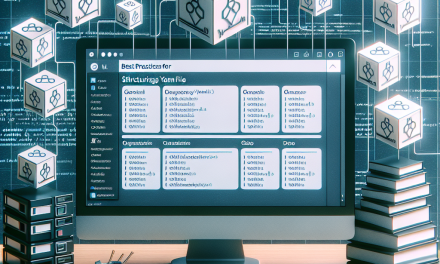In the fast-paced world of cloud-native technologies, Kubernetes stands out as the leading orchestration platform. However, with increased adoption comes heightened responsibility in terms of maintaining security and compliance. Kubernetes auditing has emerged as a critical component for organizations striving to safeguard their environments. At WafaTech, we recognize the importance of effective auditing practices and will explore how streamlining Kubernetes auditing can bolster security and compliance efforts.
Understanding Kubernetes Auditing
Kubernetes auditing involves monitoring and logging requests made to the Kubernetes API server. By capturing extensive and detailed records of system activities, organizations can gain insights into user actions, identify potential security breaches, and maintain compliance with regulatory standards.
The auditing process provides visibility into various aspects, including:
- User actions: Tracking who accessed the system and what actions they performed.
- Resource modifications: Monitoring changes to critical resources such as deployments, services, and persistent volumes.
- Access control compliance: Ensuring that permissions align with security policies.
The Increasing Need for Robust Auditing
As organizations increasingly rely on Kubernetes to manage sensitive workloads, the threat landscape is expanding. Attack vectors can come from inside (malicious actors or misconfigurations) or outside the organization (cyberattacks). To maintain a robust security posture and ensure compliance with standards like GDPR, HIPAA, or PCI-DSS, a comprehensive auditing strategy is essential.
Challenges in Kubernetes Auditing
While Kubernetes provides built-in auditing capabilities, many organizations face challenges due to the following:
- Complexity: Kubernetes clusters can have numerous components, making it difficult to trace user actions across the environment.
- Volume of Logs: The sheer volume of audit logs can be overwhelming, making it hard to identify relevant information quickly.
- Retention and Analysis: Retaining logs for compliance purposes and analyzing them for actionable insights can strain resources.
Streamlining the Auditing Process
To enhance security and compliance, organizations can adopt strategies to streamline the Kubernetes auditing process:
1. Define Clear Audit Policies
Crafting well-defined audit policies is the foundation of effective auditing. Organizations should identify critical actions to log, including access to sensitive resources, policy changes, and administrative tasks. Implement granular control over logging levels to filter out unnecessary noise.
2. Implement Centralized Logging Solutions
Using centralized logging solutions such as Elasticsearch, Fluentd, and Kibana (EFK) or the Loki-Grafana stack can significantly improve the management of audit logs. By aggregating logs in a single location, security teams can more easily search, filter, and visualize data for analysis.
3. Leverage Automation
Automation can play a vital role in enhancing the auditing workflow. Consider using tools like kube-audit, which provides simplified access to audit logs, or leveraging Kubernetes’ built-in webhook functionalities to automatically send audit logs to external systems for processing.
4. Utilize Advanced Analytics
Adding machine learning and AI-driven analytics can elevate the auditing process to the next level. By correlating events, detecting anomalies, and identifying patterns, organizations can proactively uncover potential security threats or compliance violations.
5. Regular Audits and Reviews
Regularly scheduled audits help organizations stay on top of both security vulnerabilities and compliance needs. Consistent reviews of logs and policies ensure that the audit strategy remains effective and adapts to evolving threats.
6. Compliance Check Automation
Incorporating compliance automation tools into the auditing framework can help monitor compliance posture continuously. Tools like Open Policy Agent (OPA) enable dynamic policy enforcement, ensuring configurations comply with predefined standards in real time.
The Path Forward
As the Kubernetes ecosystem continues to evolve, organizations must prioritize their security measures. Streamlining Kubernetes auditing is not just about capturing data; it’s about transforming raw information into actionable insights that can inform decision-making and strengthen security postures.
At WafaTech, we believe that simplifying the auditing process enhances visibility and accountability. By adopting a proactive approach to Kubernetes auditing, organizations can not only achieve compliance but also foster a culture of security that permeates their cloud-native environments.
In conclusion, the importance of an effective Kubernetes auditing strategy cannot be overstated. Embracing best practices, leveraging modern tools, and fostering a security-first mindset are essential steps toward a secure and compliant Kubernetes landscape. The future of cloud-native security is here, and it begins with auditing excellence.





